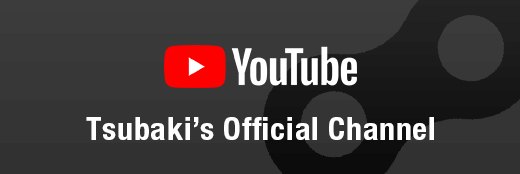Cultivation and Utilization of Human Resources
Basic Concept
Our founding philosophy of “Value-discerning open-mindedness and cooperation” means “to always place the greatest importance on caring for people, to always work together, and to seek mutual understanding without compromise through friendly competition.” This philosophy has remained unchanged to this day, and it has become the basis of our business activities. We recognize that human resources are the most vital component of our management base. Based on this recognition, we conduct human resources training and education and support the active participation of employees, as we believe that the growth of our employees is linked to the sustainable growth of the company. We also recognize that respecting a diversity of opinions and values is what generates innovation and improvement. To make the most of this, we have set up a corporate environment and employee management system for recruiting and utilizing a wide range of human resources.
In developing human resources, we are investing in the people who will drive our business toward achieving the goals of our Long-Term Vision 2030, focusing on training digital transformation employees and next-generation management leaders in line with our business strategies, implementing a global human resources training program, and taking other active steps to create opportunities.
We have established the following targets which embody the application in our everyday work of the Code of Conduct prescribed in our corporate philosophy, Tsubaki Spirit.
• Continuously take on challenges with a desire for self-betterment
• Constantly acquire advanced skills, and continuously seek to enhance them
• Be able to take action under your own responsibility
We support the steady growth of our employees of all job types, such as providing them with various opportunities for training and education in a systematic and scheduled manner, as well as creating a human resources training and education roadmap every five years for entry-level employees.
Enhancing Our Training and Educational System
The drivers of the Group’s growth are the technological capabilities and advanced technical skills we have continuously refined as a manufacturing company since our founding in 1917. With the aim of passing on expertise to the next generation and reinforcing technical skills, we launched the Tsubaki Techno School in April 1998 for entry-level engineers. Subsequently, we expanded the curriculum to include technical and sales categories. We have reorganized the curriculum by opening a Techno School for engineers, a Skills School for technicians, and a Business School for office and sales staff. While enhancing the content of each training category, we are also supporting the introduction of new technologies and skills, for example, those related to DX.
By combining training by function with level-specific training across all job categories, we have generated a positive cycle in which we increase the awareness of employees and enhance technological and technical levels.
We are also carrying out a global human resources training program that includes selective training to cultivate next-generation business leaders.
For employees, an individual human resources training and education roadmap is created every five years, and career planning interviews are conducted regularly between superiors and subordinates in order to support individual growth.
Human Resources Training System (Tsubakimoto Chain)
Objective: To train personnel strategically and systematically with the ability to anticipate and flexibly respond to changes in the social environment while broadly contributing to society through their personal growth.
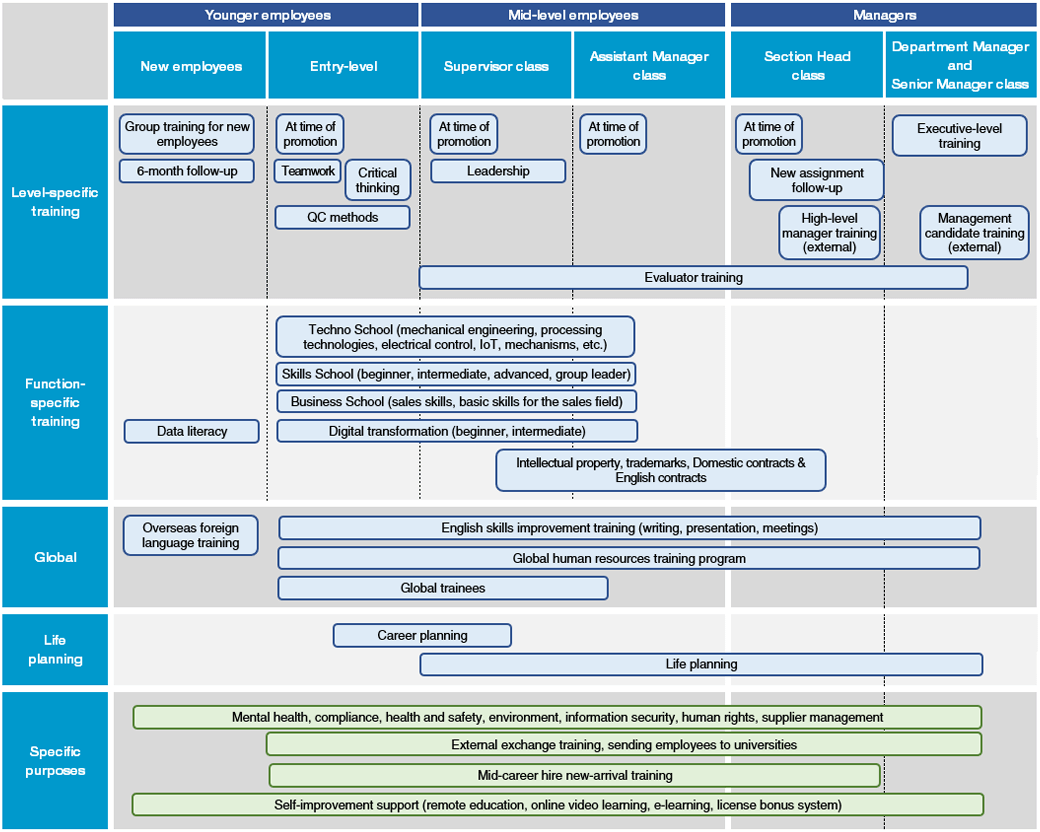
(1) Cultivation of entry-level Engineers
The Tsubaki Techno School conducts practical training using our original curriculum. It includes a beginners’ skills course, which deals with basic technologies and processing technologies, an intermediate skills course, which covers materials engineering, control engineering, and computer science, and more. In the intermediate course, entry-level engineers improve their problem-solving capabilities in addition to enhancing their knowledge and skills through activities such as setting a topic from among issues at the workplace and implementing measures to resolve it. We are also incorporating new technological fields into the curriculum and developing digital transformation human resources in line with our business strategy, for example, by planning DX and computer training.
Besides this training, we are, through a Technology Forum at which departments present their latest technologies, widening opportunities for employees to share ideas, interact, and engage in co-creation in a way that transcends departments.
In addition, we assign entry-level and mid-career engineers to outside seminars as a growth opportunity. This is where they can learn advanced technologies and technology management, and interact with engineers from outside the company.
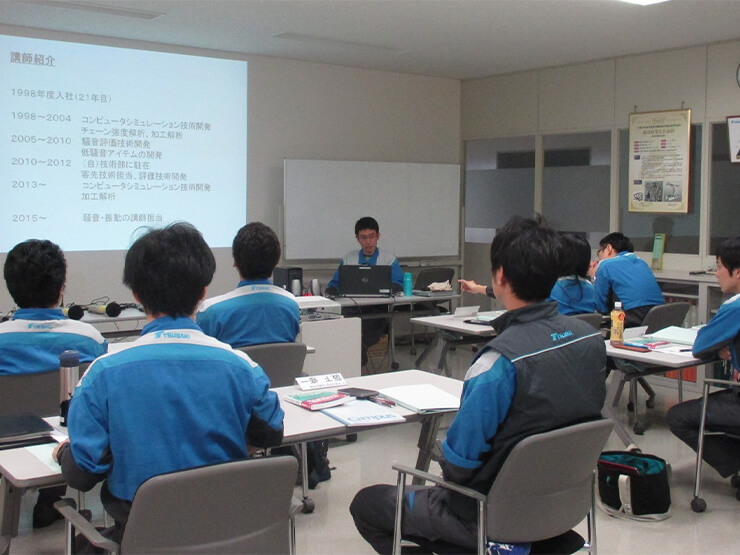
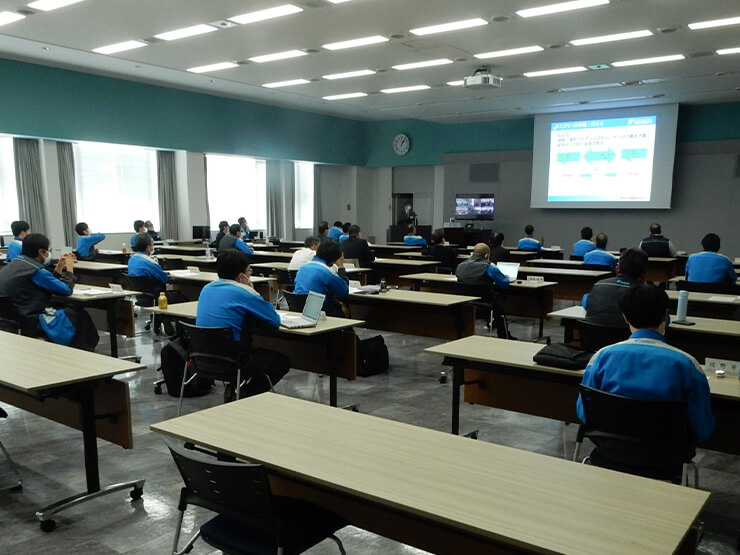
(2) Improvement of Monozukuri Skills
The Tsubaki Group is making efforts to pass down and reinforce monozukuri (manufacturing) skills by (1) cultivating technicians, (2) providing a processing training program that, through hands-on instruction in basic technologies and skills, aims to pass down our company’s unique assets, and (3) cultivating next-generation employees by establishing the qualification of Master Craftsman, the highest ranking qualification for technicians.
We are also offering post-promotion level-specific training and advanced technician training for employees who are in charge of creating environments for and activating the cultivation of instruction in the workplace by using their expertise and experience. These training programs contribute to further improving technical skills.
Since 2012, the Tsubaki Technical Skills Olympics have served as a platform for the mutual study and presentation of these skills. Outstanding technicians in the Tsubaki Group assemble to compete in ten events for all operation categories, such as Engine Lathe Operation, Welding, Measurement, and CAD Drafting. Those with the best scores are given gold, silver, and bronze medals. The 11th Olympics were held in 2024, and a total of 175 people participated in 13 teams, including representatives from 4 companies outside Japan. Panels are displayed at all plants listing the prizewinners and the technicians who have entered the Hall of Fame, and praising their skills and hard work. In addition to improving technical skills, the Tsubaki Technical Skills Olympics contribute to invigorating the organization through skills instruction and communication that spans business divisions and countries of origin.
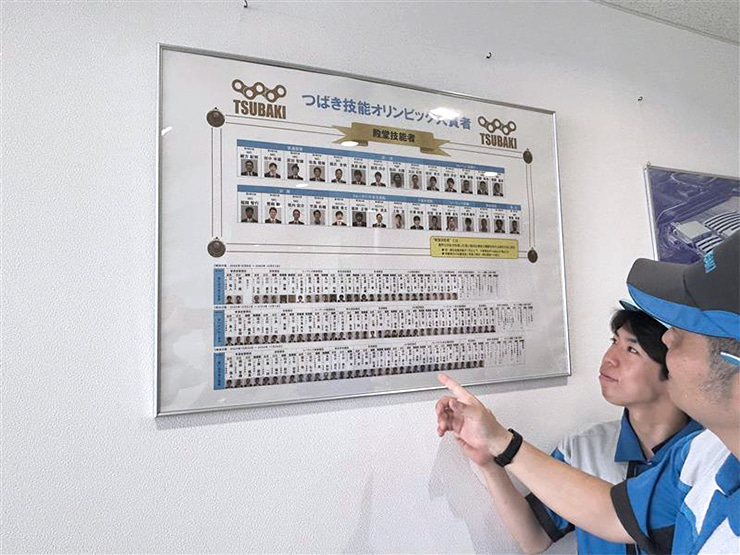
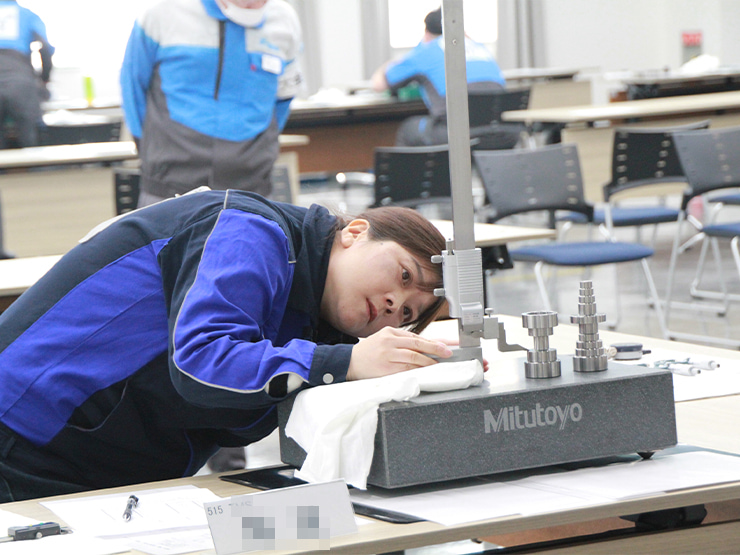
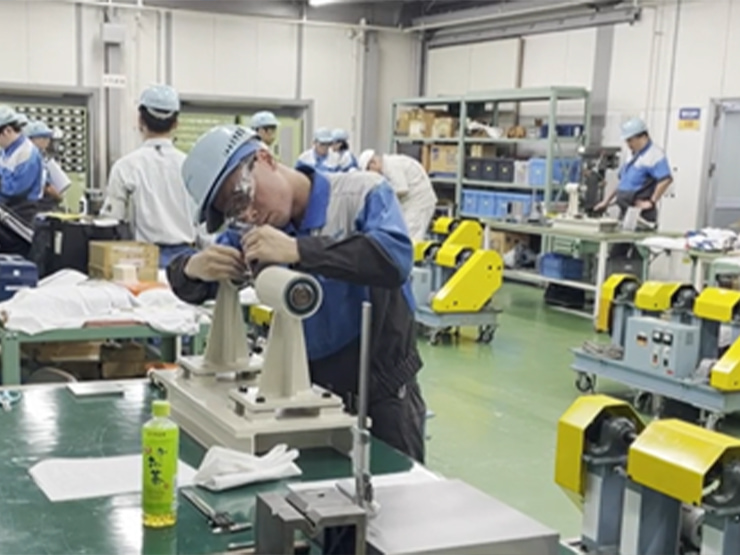
(3) Cultivation of Global Human Resources
In FY 2024, the Tsubaki Group’s total net sales that came from outside Japan grew to 65.3%. Currently, 50.9% of all Group employees work at locations outside Japan.
This situation has made the cultivation and strengthening of globally minded human resources a task of extreme importance for the Group. We introduced our global trainee system in FY 2010. This system allows entry-level Japanese employees to be assigned to subsidiaries outside Japan for one year of training. This experience is intended to expose them to other languages and international business practices, while helping them better understand other cultures. To date, a total of 130 entry-level employees have been assigned overseas as part of this system. We are also striving to cultivate and strengthen our pool of employees who can work globally through international training programs for entry-level employees and customized training for cultivating international employees.
In addition to these initiatives, we are also actively accepting assigned employees from overseas Group companies. So far seven employees from the United States, Thailand, China, India, and South Korea have been posted to business sites in Japan. In FY 2024, an employee from a subsidiary in Germany was accepted as a trainee for six months. By working together with local employees at the head office and main factory in Japan, they get the opportunity to better understand our company’s corporate philosophy, Tsubaki Spirit, and to acquire technical skills and knowledge during their time working in Japan, which they bring back with them to their home country and fully apply at work. It is also an excellent opportunity for employees in Japan to deepen their mutual understanding with the assigned employees and be exposed to international mindsets.
Topics
Update Management Training for Section Heads
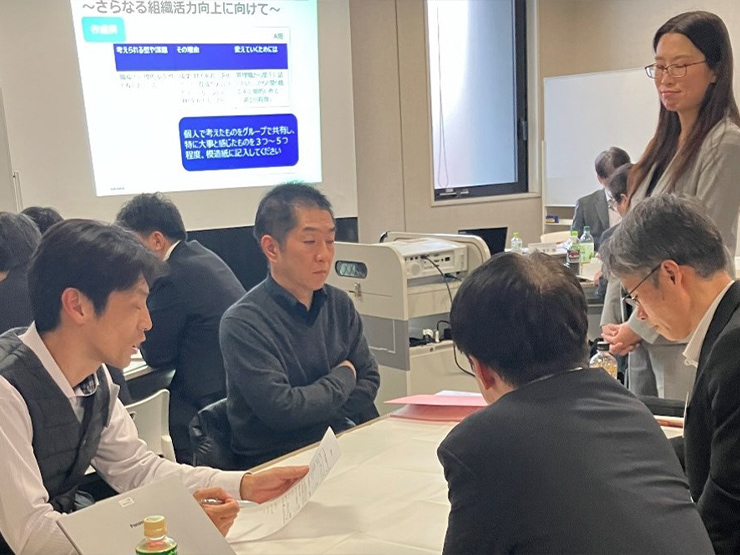
Update management training is practical training aimed at Section Heads from Tsubakimoto Chain and Group Companies in Japan. It involves seminars and group discussions on themes such as compliance risks and skills for communicating with subordinates. Through the training, participants share methods for interacting with subordinates who are older in age and with members of Generation Z, along with the concerns faced by other departments, and by verbalizing the concepts and behavior they wish to incorporate in their own management, the goal of the training is to improve both communication with subordinates and organizational operations capabilities. Such practical implementation will lead to the creation of safe and secure workplaces in which there are no industrial accidents or quality fraud.


